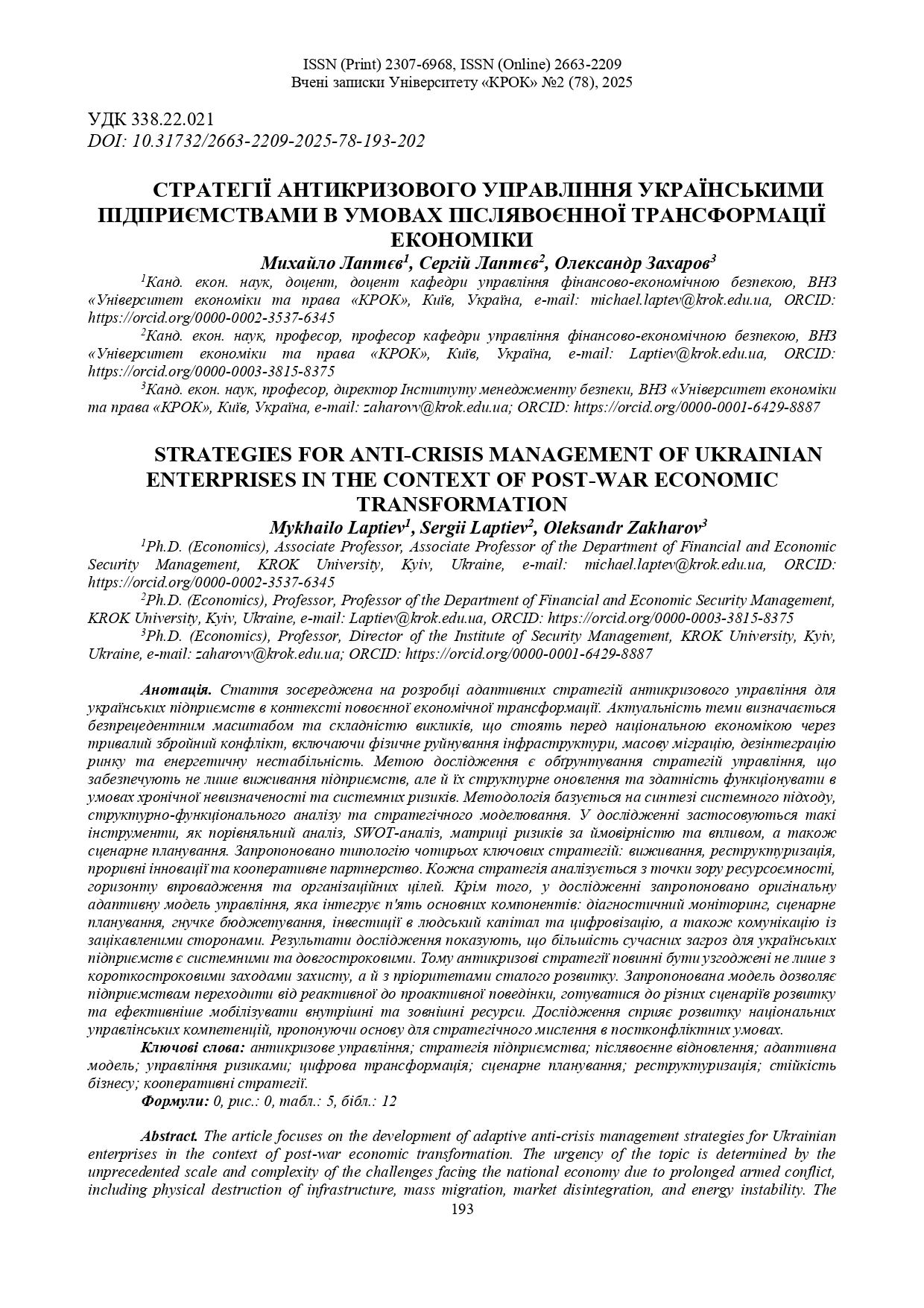STRATEGIES FOR ANTI-CRISIS MANAGEMENT OF UKRAINIAN ENTERPRISES IN THE CONTEXT OF POST-WAR ECONOMIC TRANSFORMATION
DOI:
https://doi.org/10.31732/2663-2209-2025-78-193-202Keywords:
anti-crisis management, enterprise strategy, post-war recovery, adaptive model, risk management, digital transformation, scenario planning, restructuring, business resilience, cooperative strategiesAbstract
The article focuses on the development of adaptive anti-crisis management strategies for Ukrainian enterprises in the context of post-war economic transformation. The urgency of the topic is determined by the unprecedented scale and complexity of the challenges facing the national economy due to prolonged armed conflict, including physical destruction of infrastructure, mass migration, market disintegration, and energy instability. The purpose of the study is to substantiate management strategies that ensure not only the survival of enterprises but also their structural renewal and the ability to operate under conditions of chronic uncertainty and systemic risks. The methodology is based on the synthesis of a systems approach, structural-functional analysis, and strategic modeling. The research applies tools such as comparative analysis, SWOT analysis, risk matrices by probability and impact, and scenario planning. A typology of four key strategies is proposed: survival, restructuring, breakthrough innovation, and cooperative partnership. Each strategy is analyzed in terms of resource intensity, implementation horizon, and organizational goals. Moreover, the research proposes an original adaptive management model that integrates five core components: diagnostic monitoring, scenario planning, flexible budgeting, investment in human capital and digitalization, and stakeholder communication. The results of the study show that most of the current threats to Ukrainian enterprises are systemic and long-term. Therefore, anti-crisis strategies should be aligned not only with short-term protection measures but also with sustainable development priorities. The proposed model allows enterprises to move from reactive to proactive behavior, prepare for various development scenarios, and mobilize internal and external resources more effectively. The study contributes to the development of national managerial competencies by offering a framework for strategic thinking in post-conflict conditions.
Downloads
References
Blanc, H. (2018). Anti-crisis management of enterprises: Conceptual foundations and implementation mechanisms. Kyiv: KNEU Publishing House.
Gerasymenko, O. (2023). Strategic adaptation of Ukrainian enterprises in the conditions of post-war recovery. Journal of Economic Development and Reform, 7(2), 42–55. https://doi.org/10.1234/jedr.v7i2.2023.042
Hamel, G., & Prahalad, C. K. (1994). Competing for the future. Boston, MA: Harvard Business School Press.
International Labour Organization. (2022). Employment and resilience in fragile and conflict-affected settings: A review of strategies. Geneva: ILO. https://www.ilo.org/publications
Kalinin, O. V. (2020). Anticrisis management in the conditions of global uncertainty. Economic Bulletin, 12(3), 18–25.
Lengnick-Hall, C. A., Beck, T. E., & Lengnick-Hall, M. L. (2011). Developing a capacity for organizational resilience through strategic human resource management. Human Resource Management Review, 21(3), 243–255. https://doi.org/10.1016/j.hrmr.2010.07.001
Lipych, L. I. (2022). Strategic risk management of Ukrainian enterprises in wartime. Problems of Economy and Management, 3(45), 33–40.
Melnyk, A. F., & Kolisnyk, M. V. (2021). Transformation of business strategies in conditions of hybrid threats. Business Inform, 11, 121–128. https://doi.org/10.32983/2222-4459-2021-11-121-128
Mitroff, I. I. (2005). Why some companies emerge stronger and better from a crisis: 7 essential lessons for surviving disaster. New York, NY: AMACOM.
Porter, M. E. (1998). Competitive advantage: Creating and sustaining superior performance. New York, NY: Free Press.
Sheffi, Y. (2007). The resilient enterprise: Overcoming vulnerability for competitive advantage. Cambridge, MA: MIT Press.
World Bank. (2023). Ukraine rapid damage and needs assessment – February 2023 update. Washington, DC: World Bank Group. https://documents.worldbank.org

Downloads
Published
How to Cite
Issue
Section
License

This work is licensed under a Creative Commons Attribution-NonCommercial 4.0 International License.

